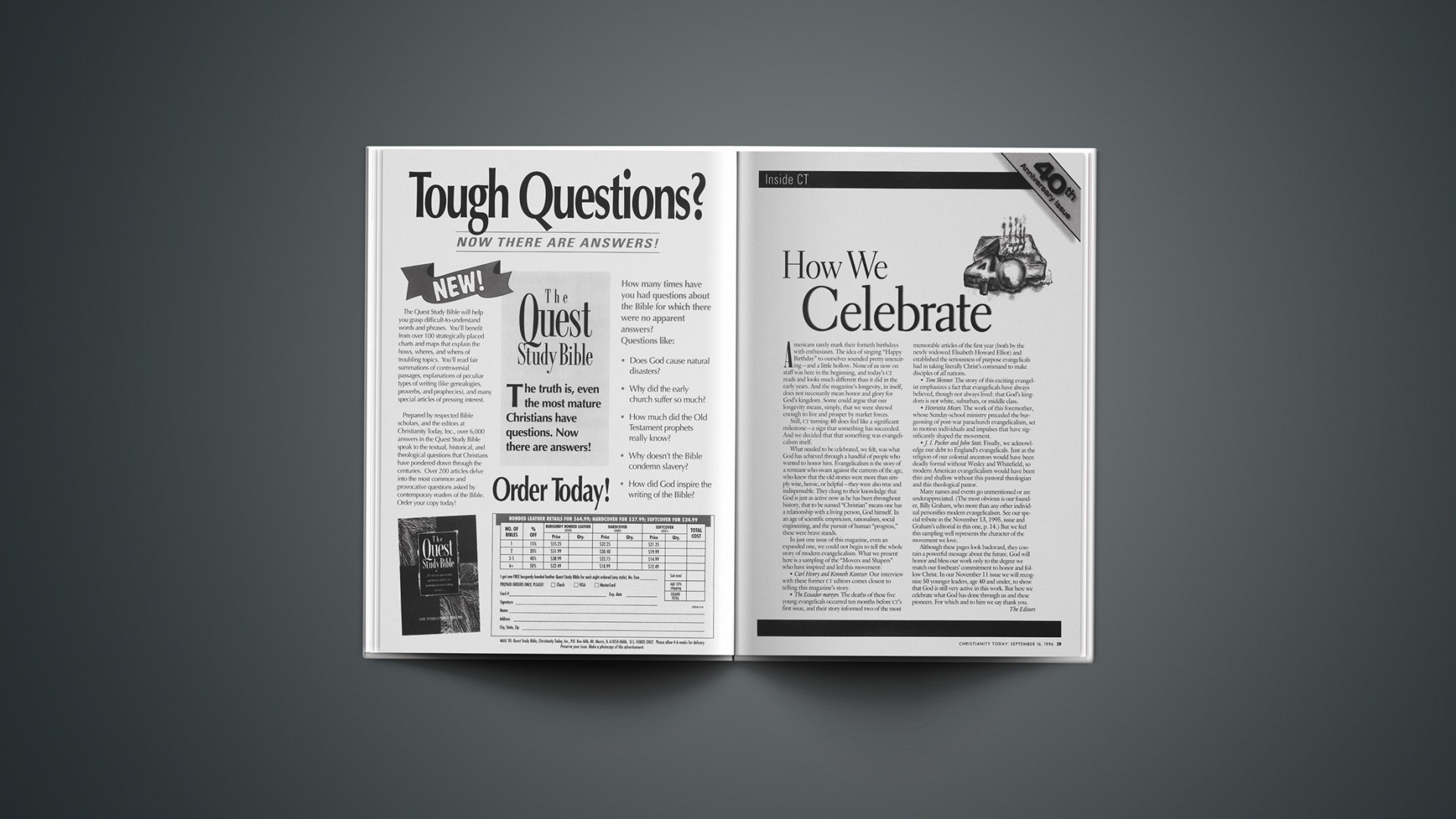Americans rarely mark their fortieth birthdays with enthusiasm. The idea of singing “Happy Birthday” to ourselves sounded pretty unexciting-and a little hollow. None of us now on staff was here in the beginning, and today’s CT reads and looks much different than it did in the early years. And the magazine’s longevity, in itself, does not necessarily mean honor and glory for God’s kingdom. Some could argue that our longevity means, simply, that we were shrewd enough to live and prosper by market forces.
Still, CT turning 40 does feel like a significant milestone-a sign that something has succeeded. And we decided that that something was evangelicalism itself.
What needed to be celebrated, we felt, was what God has achieved through a handful of people who wanted to honor him. Evangelicalism is the story of a remnant who swam against the currents of the age, who knew that the old stories were more than simply wise, heroic, or helpful-they were also true and indispensable. They clung to their knowledge that God is just as active now as he has been throughout history, that to be named “Christian” means one has a relationship with a living person, God himself. In an age of scientific empiricism, rationalism, social engineering, and the pursuit of human “progress,” these were brave stands.
In just one issue of this magazine, even an expanded one, we could not begin to tell the whole story of modern evangelicalism. What we present here is a sampling of the “Movers and Shapers” who have inspired and led this movement:
- Carl Henry and Kenneth Kantzer. Our interview with these former CT editors comes closest to telling this magazine’s story.
- The Ecuador martyrs. The deaths of these five young evangelicals occurred ten months before CT’s first issue, and their story informed two of the most memorable articles of the first year (both by the newly widowed Elisabeth Howard Elliot) and established the seriousness of purpose evangelicals had in taking literally Christ’s command to make disciples of all nations.
- Tom Skinner. The story of this exciting evangelist emphasizes a fact that evangelicals have always believed, though not always lived: that God’s kingdom is not white, suburban, or middle class.
- Henrietta Mears. The work of this foremother, whose Sunday-school ministry preceded the burgeoning of post-war parachurch evangelicalism, set in motion individuals and impulses that have significantly shaped the movement.
- J. I. Packer and John Stott. Finally, we acknowledge our debt to England’s evangelicals. Just as the religion of our colonial ancestors would have been deadly formal without Wesley and Whitefield, so modern American evangelicalism would have been thin and shallow without this pastoral theologian and this theological pastor.
Many names and events go unmentioned or are underappreciated. (The most obvious is our founder, Billy Graham, who more than any other individual personifies modern evangelicalism. See our special tribute in the November 13, 1995, issue and Graham’s editorial in this one, p. 14.) But we feel this sampling well represents the character of the movement we love.
Although these pages look backward, they contain a powerful message about the future. God will honor and bless our work only to the degree we match our forebears’ commitment to honor and follow Christ. In our November 11 issue we will recognize 50 younger leaders, age 40 and under, to show that God is still very active in this work. But here we celebrate what God has done through us and these pioneers. For which and to Him we say thank you.
The Editors
Copyright © 1996 Christianity Today. Click for reprint information.










